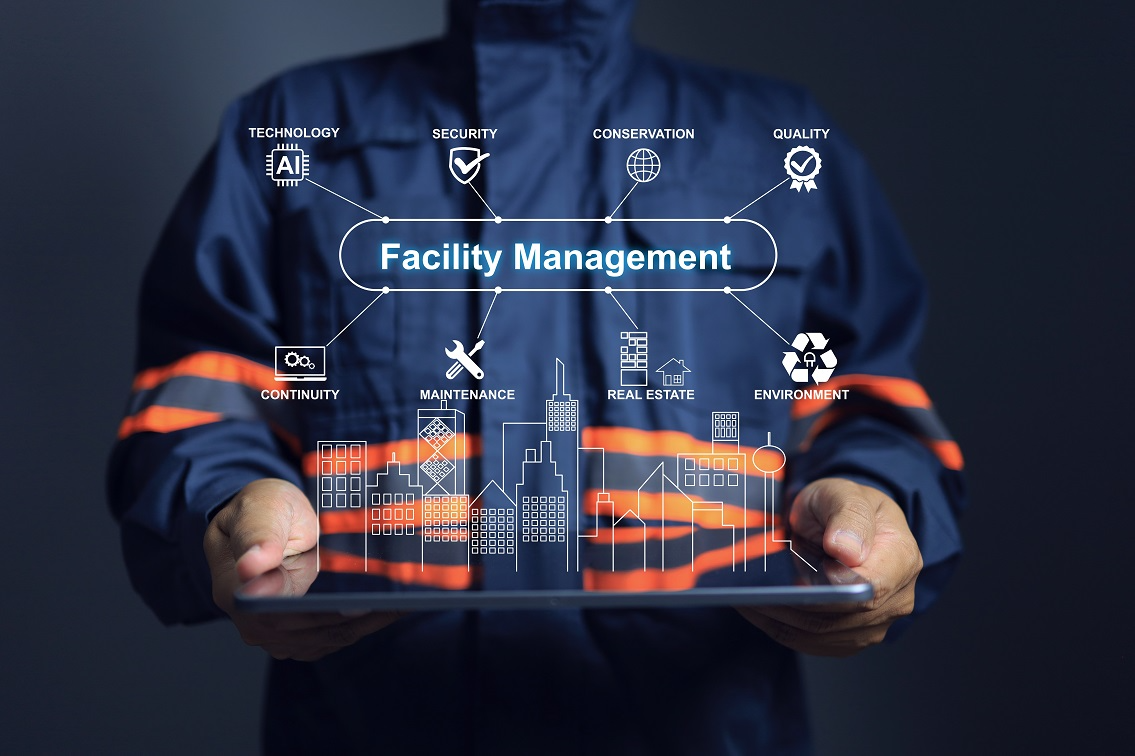Facility Management for Commercial Buildings-- A Complete Summary
Facility Management for Commercial Buildings-- A Complete Summary
Blog Article
Trick Trends Shaping the Future of Facility Monitoring in 2024
As we look in advance to 2024, the landscape of facility management is poised for considerable change, driven by numerous crucial trends. The integration of clever building innovations and a change in the direction of data-driven decision-making guarantee to boost operational efficiency while prioritizing sustainability in method. In addition, the appearance of hybrid work designs is reshaping workplace atmospheres, necessitating innovative style services that deal with evolving staff member requirements. Amidst these adjustments, the concentrate on passenger wellness remains to obtain grip, emphasizing the value of a healthy work environment. Just how these patterns will certainly manifest in practice remains an essential inquiry for industry specialists.
Smart Structure Technologies

Smart building modern technologies incorporate a vast variety of systems, including smart illumination, heating and cooling controls, and safety and security systems. By incorporating these systems, facility managers can monitor and adjust specifications in real-time, resulting in significant reductions in power waste and functional expenses. For example, clever sensing units can discover tenancy degrees and adjust lights and temperature accordingly, guaranteeing that power is just used when needed.
In addition, these modern technologies facilitate enhanced data collection, permitting organizations to track use patterns and determine opportunities for more improvements. The application of wise structure technologies not only contributes to sustainability objectives but additionally creates much healthier workplace that can enhance employee performance and complete satisfaction.
As we move right into 2024, the fostering of smart building technologies will likely speed up, reflecting a broader shift in the direction of even more smart, receptive, and sustainable facility monitoring techniques.
Data-Driven Choice Making
Progressively, organizations are leveraging data-driven choice making to boost facility administration practices. By using information analytics, facility managers can derive actionable understandings that substantially boost functional efficiency and source allowance. The assimilation of innovative technologies, such as IoT sensors and real-time monitoring systems, allows the collection of vast quantities of data on building efficiency, occupancy rates, and power usage.
This wide range of info enables center supervisors to recognize fads, forecast maintenance requirements, and proactively address concerns prior to they intensify. Anticipating analytics can anticipate devices failures, minimizing downtime and fixing costs. Furthermore, information visualization devices facilitate much better interaction among stakeholders, guaranteeing that notified decisions are made collaboratively.
Moreover, data-driven techniques enhance strategic preparation by making it possible for facility supervisors to evaluate the effectiveness of existing methods and make notified choices relating to investments in technology or framework. As companies progressively focus on functional excellence, data-driven decision making is positioned to become a cornerstone of effective facility administration techniques in 2024 and past. Eventually, the capacity to utilize data successfully will empower organizations to develop extra efficient, efficient, and resilient facilities.
Sustainability and Environment-friendly Practices
The emphasis on data-driven choice making naturally aligns with the growing concentrate on sustainability and eco-friendly practices within facility management. As organizations increasingly focus on environmental obligation, facility supervisors are leveraging analytics to optimize source use, reduce waste, and decrease carbon impacts. This calculated strategy enables the integration of energy-efficient systems, such as LED lights, wise HVAC controls, and eco-friendly power resources right into center operations.
Moreover, the execution of lasting methods expands beyond power consumption. Center supervisors are advertising and adopting environmentally friendly products recycling initiatives to create a circular economic climate within their centers. This not just enhances the ecological profile of the organization however additionally fosters a society of sustainability amongst employees.
Compliance with environmental guidelines is another important element driving the fostering of environment-friendly practices. By utilizing data analytics, center managers can check conformity metrics and determine locations for enhancement, guaranteeing adherence to global and neighborhood sustainability standards.
Hybrid Job Models
A significant change in the direction of crossbreed work designs is reshaping the landscape of center administration in 2024. This standard integrates remote and in-office work, demanding a reevaluation of space use, source allocation, and worker interaction techniques. Organizations are increasingly identifying the significance of versatile workspaces that satisfy varied needs and preferences.
Center managers should adapt by executing functional workplace styles that support collaborative initiatives while supplying locations for concentrated job. This includes the assimilation of modern technology to facilitate seamless communication and cooperation among in-office and remote staff members. Smart building solutions, equipped with sensing units and analytics, permit real-time tracking of room use, enabling companies to enhance their environments successfully.
In addition, crossbreed work designs emphasize the requirement for effective center administration that prioritizes staff member experience. In essence, the crossbreed job version is other transforming center administration, urging a proactive method to meet the progressing needs of the workforce.
Boosted Passenger Health
As organizations embrace hybrid work models, an enhanced focus on passenger wellness is ending up being integral to center administration techniques. Facility Management. This shift acknowledges that a healthy and pleased labor force straight affects efficiency and retention rates. Facility managers are now prioritizing atmospheres that advertise read what he said psychological and physical health, incorporating components such as all-natural lighting, biophilic design, and accessible wellness resources

Modern technology plays a crucial function in this advancement. Smart building systems can check environmental factors and change settings in real-time, ensuring ideal comfort levels - Facility Management. Responses systems, such as tenancy sensors have a peek at this website and worker surveys, enable center managers to constantly refine wellness campaigns based on resident needs.

Final Thought
In 2024, the future of center management will be considerably influenced by the combination of clever structure innovations and data-driven decision-making, fostering improved operational efficiency. Sustainability efforts will prioritize green methods, while the appearance of hybrid job models will certainly necessitate versatile workplace styles. An increased focus on passenger health through advanced A/c systems and biophilic design will contribute to much healthier job atmospheres. These fads jointly emphasize the advancing landscape of facility management in feedback to contemporary challenges and chances.
Facility managers are embracing environmentally friendly products and advertising recycling efforts to produce a round economic climate within their facilities.A substantial shift in the direction of hybrid work models is reshaping the landscape of facility administration in 2024.Additionally, crossbreed job designs emphasize the need for effective center administration that prioritizes employee experience.As companies welcome hybrid job models, an enhanced focus on passenger wellness is ending up being integral to center monitoring approaches.In 2024, the future of facility administration will be significantly affected by the integration of clever structure modern technologies and data-driven decision-making, cultivating improved operational performance.
Report this page